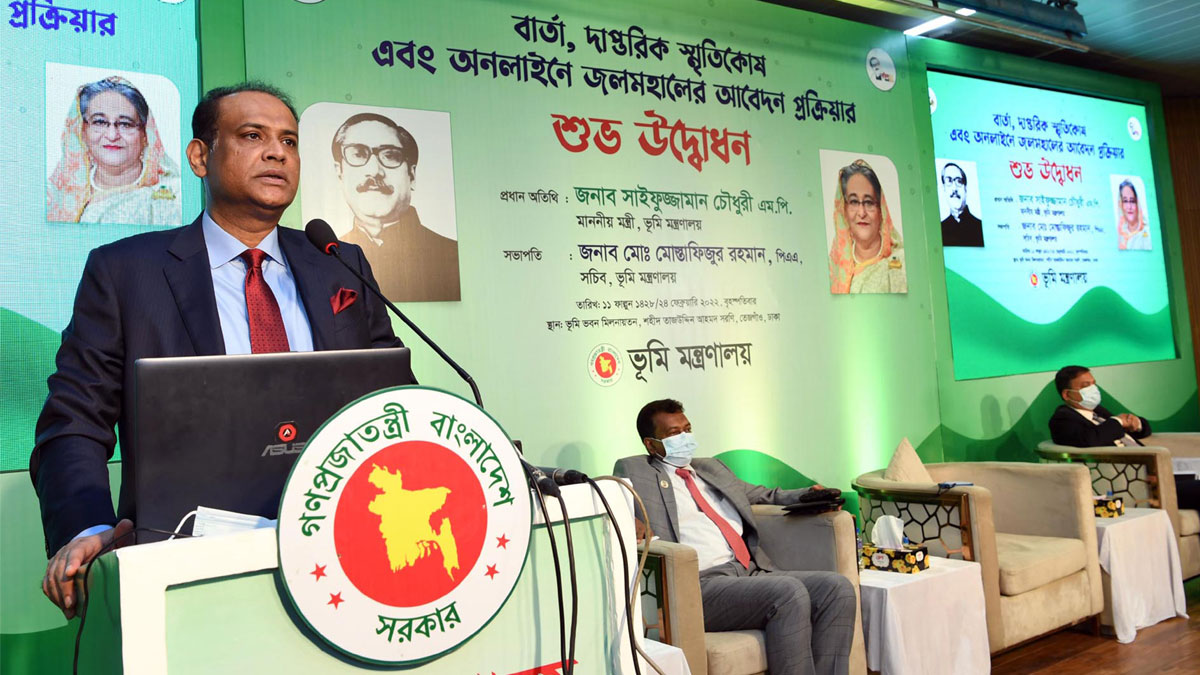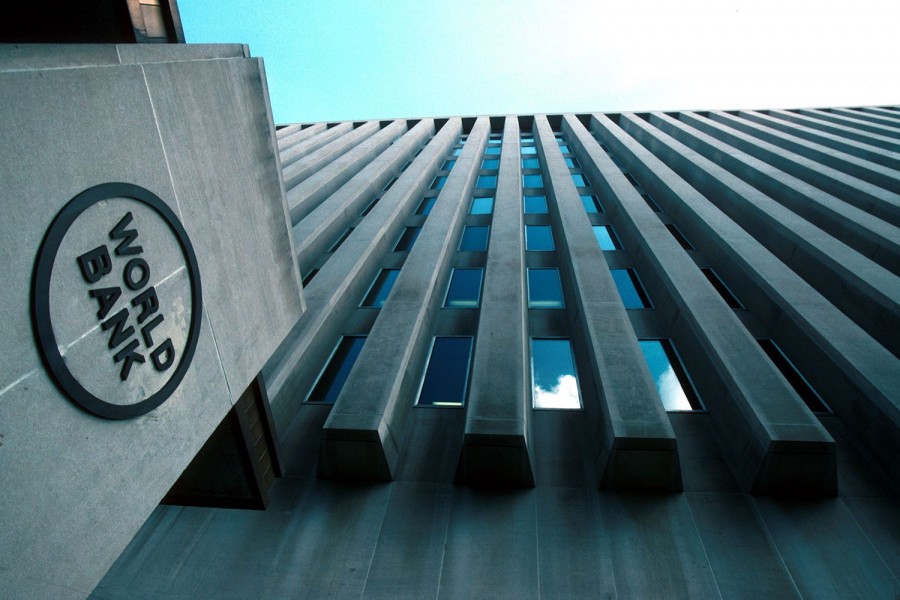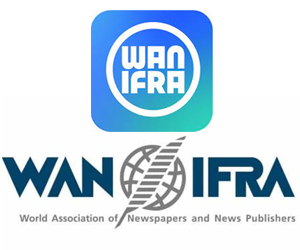Bangladesh
Land ownership to be on the basis of documents only – Land Minister
Published
4 years agoon

Land Minister Saifuzzaman Chowdhury said that under the direction of the Prime Minister, the Ministry of Land is emphasizing the establishment of sustainable land management by introducing digital services and amending the laws and regulations. In a sustainable land system, no one can occupy any land without proper documents. As a result, illegal occupants will not get a chance to grab land.
He was speaking as the chief guest at the inaugural function of ‘Barta (Message), Institutional Memory System and Online Jalmahal Lease Application Process’ held at Bhumi Bhaban in Tejgaon on Thursday. Land Secretary Md. Mustafizur Rahman PAA was present as the chair and Director General of the Department of Fisheries Khandaker Mahbubul Haque was the special guest.
Saifuzzaman Chowdhury further said that the land asset management of all the Sairat Mahals of the government will gradually come under digitalization. In the meantime, 78 percent of government land assets, Khas lands, and Sairat Mahal schedule have been uploaded to the land information bank.
Once the Land Information Bank is fully operational, it will be possible to lease government resources to the concerned professionals and businessmen with transparency and efficiency. This will increase the revenue of the government manifold – said the land minister.
The land secretary said plans have already been made to set up a payment system for land property leasing by integrating it with an automated invoicing system. Then there will be no need to receive a bank draft for payment. As a result, future leaseholders will no longer have to go to the bank.
The land secretary further said that the bona fide fishermen used to face various problems because of various tactics of the middlemen and brokers in the Jalmahal leasing process. Now there is no such opportunity. The land secretary said no complaints were received after the online Jalmahal application was experimentally started.
DG of the Fisheries Department, said that due to the online Jalmahal application system, genuine fishermen will be able to get Jalmahal lease by taking part in the competition. He added that more than 1.4 million fishermen have already been registered across the country.
At today’s inaugural function, the Lands Minister sent greetings to all Ministry of Land officials by ‘Barta’ app. In addition, the president of a fisheries co-operative society applied for Jalmahal online at the venue. The Land service digitization monitoring cell chief Dr. Jahid Hossain Panir, PAA gave a presentation on Institutional Memory System.
Replying to a question from reporters after the event, the land minister said that if the issue of inheritance of the property of third gender people is brought under the purview of the law, they will be able to get redressal of their problem within the legal framework.
Member of Parliamentary Standing Committee on Land Ministry Umme Fatema Nazma Begum, Land Reform Board Chairman Soleman Khan along with officials from various levels of Ministry of Land and its affiliated offices and agencies, Ministry of Fisheries and Livestock and Department of Fisheries were present on the event.
Online Jalmahal Lease Application Process
The Land Ministry had launched the facility of online facility of Jalmahal lease applications for the ministry level through a circular issued on November 15, 2021.
It was decided to launch an online lease application to registered and bona fide fisheries co-operative societies following Government Jalmahal Management Policy, 2009 for obtaining Jalmahal lease from Districts and Upazilas in the general application through a notification on February 10, 2022.
It is to be noted that in the ‘Development Project’ lease applications for government Jalmahal and special types of Jalmahal of above 20 acres for 6 years are presented and approved at the meeting of the ‘government Jalmahal lease committee’ chaired by the land minister at the ministry level. In the ‘General Application’, the lease application of the government Jalmahal of ‘above 20 acres for 3 years are presented and approved in the meeting of the District Jalmahal Management Committee. In the ‘General Application’, the lease application of the government Jalmahals of above 20 acres for 3 years are presented and approved in the meeting of ‘Upazila Jalmahal Management Committee’.
Institutional Memory System:
The Institutional Memory System is a digital archive of the experiences of all those involved in the land.
It will preserve the experience of implementing an event, permanently preserve the experience of someone retiring/transferring, and all will have the opportunity to be benefitted from the institutional knowledge.
Barta app:
‘Barta’ is an information exchange/messageing app for the officers and employees under the Ministry of Land. Salient features of this app are instant voice/text exchanging, interaction among the agencies of the Ministry of Land, instantaneous Central/ Divisional or District reports creating.
You may like
Bangladesh
Bangladesh’s Press at a Crossroads: Between Promises of Reform and the Shadows of Repression
Published
6 months agoon
August 14, 2025
By Md Mojahidul Islam Dheow
Bangladesh’s press is at a crossroads. A year after the mass uprising of 2024 promised a fresh dawn for the country’s long-troubled media, journalists still move under a heavy cloud of political, institutional, and psychological pressure. Across the nation, more than 250 cases have been filed against reporters in the last 12 months—not all for crimes of substance. Some are clear attempts to stifle critical reporting; others stem from something as ordinary as a social media post. The message is unmistakable: those who challenge authority face serious consequences.
Legal reform has offered a glimmer of hope with the newly debated Section 173A of the CrPC, 1898, which allows an accused to be discharged during investigation if a high-ranking police supervisor finds insufficient evidence. But the question remains: will this tool be used impartially—or selectively, to shield the powerful and punish dissenters?
The dangers facing journalists were made starkly clear on August 7, when Asaduzzaman Tuhin was killed while on duty. Just a day earlier, Anwar Hossain was assaulted while reporting on extortion at a Gazipur CNG auto-rickshaw stand. These incidents are not isolated—they are part of a pattern of violence and intimidation aimed at silencing the press.
Even the newly crafted Cyber Security Ordinance (CSO) 2025—intended to replace repressive predecessors like the Digital Security Act (DSA) 2018 and the Cyber Security Act (CSA) 2023—retains troubling elements. While some contentious sections have been removed, Section 42 still allows the use of repressive tools drawn from the ICT Act 2006, the Evidence Act 1872, and the CrPC. Vague phrases such as “public confusion,” “threats to national security,” and “anti-state acts” remain undefined, enabling broad crackdowns on civil liberties, journalism, and political opposition.
Beyond the legal framework lies a deeper crisis. Corporate influence and editorial compromises have long weakened investigative journalism in Bangladesh. The media’s role as a pillar of democratic accountability has eroded, with many outlets beholden to owners’ political and commercial interests. With no substantial institutional reform since the change in government, the press remains vulnerable to regulatory harassment, licensing obstacles, and punitive taxation whenever coverage strays from the “approved” line.
Two proposed reform measures—the Journalists’ Protection Ordinance 2025 and the National Media Commission Ordinance 2025—once promising, are stalled in bureaucratic limbo. The “one house, one media” policy, intended to prevent individuals or organizations from owning multiple outlets, remains unrealized despite the Media Reform Commission’s advocacy.
Even the Bangladesh Press Council risks becoming yet another instrument of state control unless its mandate is reimagined to prioritize journalist protections. Political divisions within journalist unions and media organizations further weaken any unified stance for press freedom. Ownership patterns skew licensing and content toward vested interests, while dissenting voices are punished through regulatory harassment or punitive audits. Inside newsrooms, self-censorship grows as fear of legal trouble and professional retaliation suppresses candid reporting. Whistleblowers remain silent, and investigative journalism is increasingly replaced by risk-averse coverage.
What Bangladesh needs is a national framework for self-regulation that binds all outlets: an internal editorial code of conduct, a grievance redressal mechanism, anti-harassment policies, and straightforward complaint resolution processes. A transparent, independent media ombudsman should adjudicate defamation claims and public complaints. Only with genuine independence, accountability, and a clear commitment to journalist safety can the industry rebuild trust and integrity.
Beyond reform, there is an urgent need for immediate protection and practical empowerment of reporters in the field. The proposed Journalists’ Rights Protection Ordinance 2025 aims to codify such protections, with penalties of up to five years’ imprisonment and substantial fines for violence against journalists. It would:
(a) defend journalists from violence, threats, and harassment;
(b) shield sources and protect newsroom independence;
(c) guarantee the right to work without fear;
(d) ensure safe reporting environments within media organizations;
(e) safeguard good-faith reporting; and
(f) establish clear complaint, investigation, and trial procedures.
The ordinance mandates that fines can be directed as compensation to the harmed journalist and holds both individuals and, when applicable, organizations accountable for failing to prevent or address abuses.
If implemented effectively, it could mark a turning point. But enforcement requires a judiciary capable of handling cases efficiently and free from political influence. Authorities must be bound by law to protect journalists, safeguard newsroom neutrality, and defend those who publish information in the public interest.
The current moment is pivotal. Real reform demands more than laws on paper—it requires political courage, institutional independence, and a mature democratic culture. Journalists must unite beyond political divides, media owners must shed partisan agendas, and the state must commit to protecting the very people who hold it accountable.
Time is slipping away. Each delay erodes public trust, silences more journalists, and buries more truths. If Bangladesh is to have a democracy worthy of the name, it must build a press that is free, secure, and independent—not as an ornament of democracy, but as its beating heart.
Bangladesh
Investigation: Hasina’s ‘Shoot Directly’ Order and Its Deadly Consequences
Published
7 months agoon
July 25, 2025
On the morning of July 27, 2024, Sheikh Hasina stood silently at the podium of the National Institute of Traumatology and Orthopedic Rehabilitation (NITOR), commonly known as Pongu Hospital, in Dhaka.
For nearly 14 seconds during her eight-minute emotional speech, the former prime minister remained silent. A visible pain marked her face, reflecting the weight of the bloodshed that had occurred since July 16, when police forces fatally shot Abu Sayed in Rangpur with lethal weapons. That day, five more lives were lost amidst violence in Dhaka and Chattogram.
By the time Hasina addressed the crowd at NITOR, the death toll across the last two weeks had reached at least 162, many of whom had been shot with military-grade weapons by state security forces, according to The Daily Star’s investigations.
“I seek justice from my fellow citizens. What crimes have I committed to deserve this?” 77-year-old Hasina asked after visiting some of the injured at the hospital.
“I don’t want any mothers to lose their children like this. I’ve lost my parents; I know the pain… So many lives have been lost, so many families shattered. Who is responsible for all this?…” she began, but then, overcome with emotion, she left the stage in tears, unable to finish her words.
This heartfelt public address sharply contrasts with what was happening behind the scenes. An investigation by The Daily Star reveals that a state-sponsored machinery for mass violence had already been put into motion.
Just nine days earlier, on the evening of July 18, 2024, a phone rang inside the ousted prime minister’s residence, Gonobhaban, and Sheikh Hasina answered. On the line was Sheikh Fazle Noor Taposh, then the mayor of Dhaka South City. What followed was a startling disclosure of a lethal plan.
“We are now doing things differently. We are capturing photos with drones, and sending helicopters to several places,” Hasina told Taposh.
“Wherever they [the state forces] see gatherings, from the sky… I am getting it done from above, already started in several areas… already underway,” she said, while Taposh repeatedly pressed for launching a large-scale arrest campaign.
Bangladesh
WB to provide $250m loan to modernise five public sector functions
Published
8 months agoon
June 15, 2025
The World Bank (WB) would provide US$250 million funds to facilitate improving transparency, accountability, and efficiency of some key government agencies in Bangladesh.
FE
The WB board on Saturday approved the loan to support the ongoing reform initiatives of the interim government, aimed at modernising crucial public sector functions.
These are essential for improving data transparency, domestic revenue mobilisation, public investment management, public procurement, and financial oversight, according to a statement issued on Saturday.
Under the Strengthening Institutions for Transparency and Accountability (SITA) project, five key government agencies – the Bangladesh Bureau of Statistics (BBS), the National Board of Revenue (NBR), the Planning Division, the Bangladesh Public Procurement Authority (BPPA), and the Office of the Comptroller and Auditor General (CAG) – would reform their operational activities.
The project is expected to streamline operations and improve service delivery within the five agencies and enhance access to reliable public statistics, crucial for transparent and accountable decision-making and policy formulation.
It will help modernise tax administration and increase tax compliance, thereby improving much-needed revenue mobilisation and fiscal sustainability.
The WB loan will also help improve the efficiency and accountability of public spending, ensuring that resources are utilised effectively for the benefit of all citizens.
It will develop a second generation of electronic government procurement (e-GP) and broaden its scope. The project will also help strengthen and digitise public audit.
Gayle Martin, the World Bank’s Interim Country Director for Bangladesh, on Saturday said: “The investment will leverage digitisation of business processes to help improve transparency and reduce corruption, by supporting Bangladesh in modernising public institutions capable of serving an emerging economy.”
This project will help improve the quality and accessibility of public services and thus enhance public trust in government institutions, she added.
According to the statement, the Bangladesh government and the WB are also preparing a development policy credit scheduled for the bank’s board discussion later this month.
Such credit is expected to support transparency and accountability in domestic revenue mobilisation, the banking sector, data production and dissemination.
Souleymane Coulibaly, World Bank Lead Country Economist and Task Team Leader for the project, said: “This project and the proposed development policy credit would be complementary and provide the government both the necessary hardware and software for improving public financial management and public service delivery.”

From Confusion to Clarity: Dheow’s Book Helps Users Master ChatGPT Conversations

Pre-Orders Open for Mojahidul Islam’s Latest Computer Book ‘AI Shikhun, Taka Gunun’

Bangladesh’s Press at a Crossroads: Between Promises of Reform and the Shadows of Repression










